KUBRICK'S LOLITA
A SHOT-BY-SHOT ANALYSIS
PART FIVE

Go to TOC for this film ( (which has also a statement on purpose and manner of analysis and a disclaimer as to caveat emptor and my knowing anything authoritatively, which I do not, but I do try to not know earnestly, with some discretion, and considerable thought).
A NOTE ON THIS ANALYSIS. I COMPARE, SCENE BY SCENE, AT THE END OF EACH, KUBRICK'S FILM WITH NABOKOV'S SCREENPLAY. I HAVE ALSO UNDERLINED THAT DIALOGUE WHICH IS FROM THE NABOKOV SCREENPLAY BUT WHICH IS USUALLY PARAPHRASED. DIALOGUE IN THE FILM WHICH WAS IN THE BOOK, BUT NOT IN THE SCREENPLAY, MAY BE UNDERLINED BUT IS OFTEN INSTEAD OUTLINED IN THE COMPARISON SECTION OF EACH SCENE.
TOC and Supplemental Posts | Part 1 | Part 2 | Part 3 | Part 4 | Part 5 | Part 6 | Part 7 | Films Home
LINKS TO SECTIONS OF THE ANALYSIS ON THIS PAGE:
Beardsley and Painting Lolita's Toenails, Shots 345 through 366
Beardsley, Nabokov as Compared to Kubrick
The Painting of Elvira by Modigliani
The Painting of the Toenails
The Real True Reality
The Psychologist, Shots 367 through 395
The Psychologist, Comparing Nabokov and Kubrick
The Index Cards
Looking at the Beardsley Layout and its Fase 90 Degree Turn
The Drome Poster and Quilty
The School Play - The Hunted Enchanters, Shots 396 through 399
The School Play, comparing Nabokov and Kubrick
Chess and the Queen
The Enchanted Hunters as versus the Hunted Enchanters
The Play and Semiramis
A Family Row, Shots 400 through 403
A Family Row, Comparing Nabokov and Kubrick
The Pay Telephone Call at the ESSO, Shots 404 through 405
The Call at the ESSO, Comparing Nabokov and Kubrick
The Curious Case of Jack Brewster
345 LS of a town. (1:38:28)
HUMBERT (narration): You must now forget Ramsdale, and poor Charlotte, and poor Lolita...
346 LS from behind the wagon. (1:38:35)
HUMBERT (narration): ...and accompany us to Beardsley College, where my lectureship...
347 LS Wagon passing down street next a college building. (1:38:39)
HUMBERT (narration): ...in French poetry is in its second semester. Six months have passed and Lolita's attending an excellent school where it is my hope that she will be persuaded to...
Crossfade to 348.
348 LS Street with white picket fence. (1:38:47)
HUMBERT (narration): ...read other things than comic books and movie romances.
Crossfade to shot 349, Humbert painting Lolita's toenails.
Shot 345 | Shot 346 |
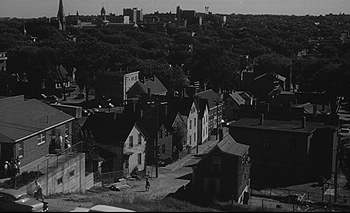 | 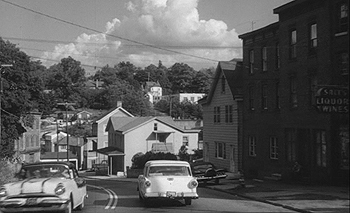 |
Shot 347 | Shot 348 |
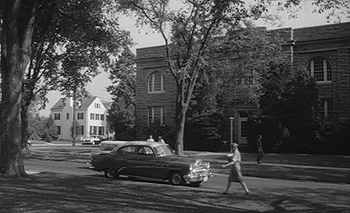 | 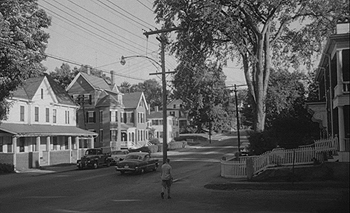 |
Note, in shot 348, the white picket fence to which our eye is attracted due a section suspended in mid-air. That it is out of place calls our eye to it and may remind us of the white picket fence of the Haze home, and the section of white picket fence hanging off the nose of the car that had struck Charlotte.
349 MCU Humbert painting Lolita's toenails. (1:38:52)
HUMBERT: Why were you so late coming home from school yesterday afternoon?
LOLITA (off screen): Yesterday, yesterday. What was yesterday?
HUMBERT: Yesterday was Thursday.
LOLITA (off screen): Oh, well, uhm, was I late?
HUMBERT: Yes, you were. You finish school at 3 o'clock. You were not home until 6 o'clock.
350 MS Humbert and Lolita. (1:39:22)
LOLITA (drinking a soda): That's right, that's right. Michelle and I, uhm, stayed to watch football practice.
HUMBERT: In the Frigid Queen?
LOLITA: What do you mean in the Frigid Queen?
HUMBERT: I was driving around and I thought I saw you through the window.
LOLITA: Oh, yeah, well we stopped there for a malt afterwards. What difference does it make?
HUMBERT: You were sitting at a table with two boys.
LOLITA: Yeah, well, Roy and Rex just happened to sit down with us.
HUMBERT: Roy and Rex.
LOLITA: The co-captains of the football team.
HUMBERT: I thought we understood--no dates.
LOLITA: What do you mean no dates? They just sat down at our table.
HUMBERT: I don't want you around them. They're nasty-minded boys.
LOLITA: Oh, you're a fine one to talk about someone else's mind.
351 MCU Humbert. (1:40:06)
HUMBERT: Don't avoid the issue. I told you no dates.
LOLITA (off screen): It wasn't a date.
HUMBERT: It was a date.
352 MS Lolita and Humbert. (1:40:14)
LOLITA: It wasn't a date.
HUMBERT: It was a date, Lolita.
LOLITA: It was not a date.
HUMBERT: It was a date.
353 MS Lolita. (1:40:18)
LOLITA: It wasn't a date.
354 MCU Humbert. (1:40:19)
HUMBERT: Well, whatever it was that you had yesterday afternoon, I don't want you to have it again.
355 MS Humbert and Lolita. (1:40:23)
HUMBERT: While we're on the subject, how'd you come to be so late on Saturday afternoon?
LOLITA: Saturday I went to my piano lesson.
HUMBERT: Your piano lesson? I thought that was on Wednesday.
LOLITA: No, it was changed to Saturday, remember? Between 2 and 4, Miss Starch, piano. Well, ask Michelle. She was with me.
HUMBERT: Ask Michelle. That's what you always say to me. For now, for a change, I'm going to ask you something about Michelle.
LOLITA: You can't have her. She belongs to a Marine.
HUMBERT: I will ignore that idiotic joke. Why does she give me these searching looks
whenever she comes to the house?
LOLITA: How should I know?
HUMBERT: Have you told her anything about us.
LOLITA: No. Have you?
HUMBERT: You've told her nothing.
LOLITA: You think I'm crazy?
HUMBERT: You spend too much time with that girl. I don't want you to see her often.
LOLITA: Oh, come on. She's the only friend I've got in this stinking world. You never let me have any fun.
356 MCU Humbert. (1:41:17)
HUMBERT: No fun?! You have all the fun in the world! We have fun together, don't we? I...whenever you want something, I buy it for you...
357 MS Lolita. (1:41:24)
HUMBERT (off screen): ...automatically. I take you to concerts, to museums, to movies. I do all the house work.
358 MCU Humbert. (1:41:29)
HUMBERT: Who does the tidying up? I do. Who does the cooking? I do.
359 MS Humbert and Lolita. (1:41:34)
HUMBERT: You and I, we have lots of fun. Don't we, Lolita?
LOLITA: Come here.
360 MCU Humbert. (1:41:43)
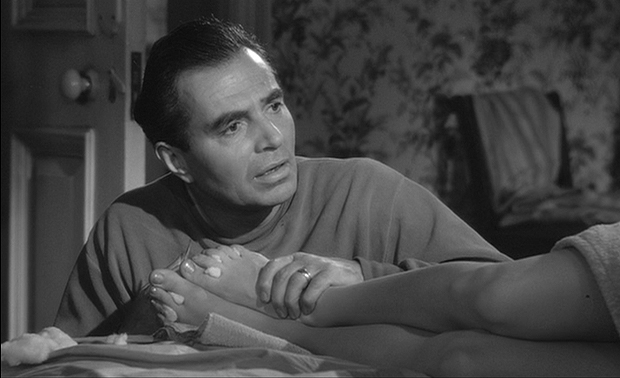
This shot stands out as one which has a quite different feel with James Mason from any other in the film.
361 MS Humbert and Lolita. (1:41:45)
Humbert goes to sit at the other side of the bed, beside her.
LOLITA: Still love me?
HUMBERT: Completely. You know that.
LOLITA: You know what I want more than anything else in the world?
HUMBERT: No, what do you want?
LOLITA: I want you to be proud of me.
HUMBERT: Well, I am proud of you, Lolita.
LOLITA: No, I mean really proud of me. You see, they want me for a lead in the school play.
362 MS Lolita and Humbert. (1:42:22)
LOLITA: Isn't that fantastic? And I have to have a letter from you, giving your permission.
HUMBERT: Who wants you?
363 MS Lolita and Humbert from the side. (1:42:28)
LOLITA: Well, Edusa Gold, the drama teacher, Clare Quilty, and Vivian Darkbloom.
HUMBERT: And who might they be?
364 MCU Lolita and Humbert. (1:42:34)
LOLITA: Oh, they're the authors. They're here to supervise the production.
HUMBERT: But you've never acted before.
LOLITA: Well, they say I have a unique and rare talent.
HUMBERT: And how do they know that?
LOLITA: Well, we had readings. And I was chosen over thirty other girls.
HUMBERT: That's the first I've heard about it.
LOLITA: I know. I wanted to surprise you.
HUMBERT: I...I suppose that Roy has a part in this production?
LOLITA: Roy? What's he got to do with this?
HUMBERT: Roy. And Rex. Naturally. I suppose they're in it, huh?
LOLITA: Well, how do I know? I only met them yesterday. And besides, they're football players, not actors.
HUMBERT: And you suddenly, over night, are an actress. Well, it's totally out of the question.
LOLITA: Out of the question?
HUMBERT: I don't want you in that atmosphere.
LOLITA: What atmosphere!?
365 MS Lolita and Humbert. (1:43:12)
LOLITA: It's just a school play.
HUMBERT: I've told you over and over again, I don't want you mixing with those boys, it's just another excuse to make dates with them and to get together close with them.
LOLITA: You don't love me.
HUMBERT: I do love you.
LOLITA: You don't love me.
HUMBERT: I do love you, Lolita.
LOLITA: Driving me crazy. You won't let me do anything. You just want to keep me locked up with you in this filthy house.
HUMBERT: Lolita, go and wash your face. I'll go downstairs and start the roast.
366 MS Lolita and Humbert. (1:43:36)
LOLITA: Some day you'll...
HUMBERT: Go and wash your face, I'll go...
LOLITA: You'll be sorry!
HUMBERT: Oh, yeah, yeah, yeah, yeah, yeah, yeah. And don't smudge your toenails!
Lolita gets up and stomps off out of frame left.
Shot 349 | Shot 350 |
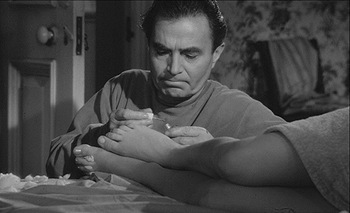 | 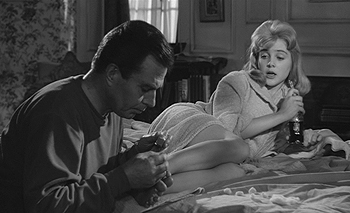 |
Shot 351 | Shot 352 |
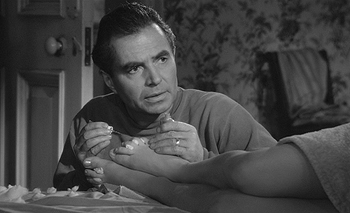 | 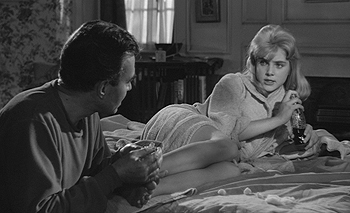 |
Shot 353 | Shot 354 |
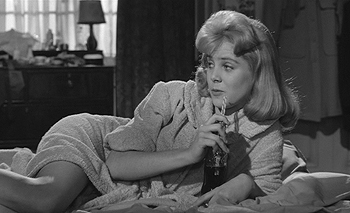 | 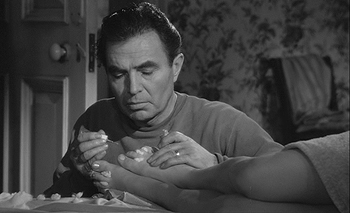 |
Shot 355 | Shot 356 |
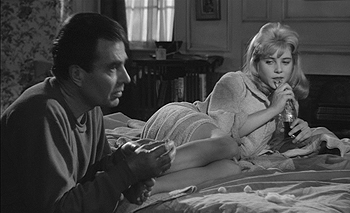 | 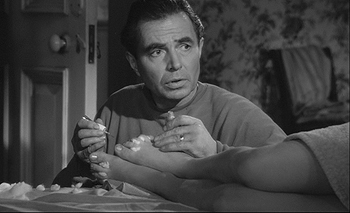 |
Shot 357 | Shot 358 |
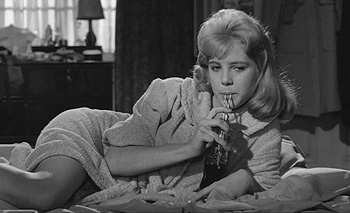 | 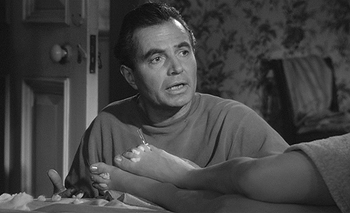 |
Shot 359 | Shot 360 |
 | 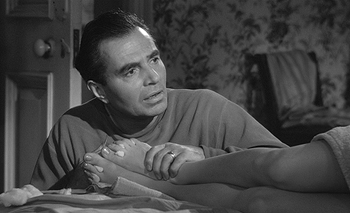 |
Shot 361 | Shot 362 |
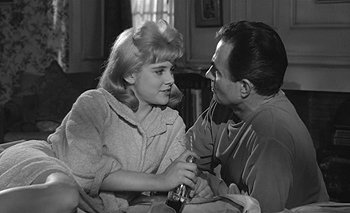 | 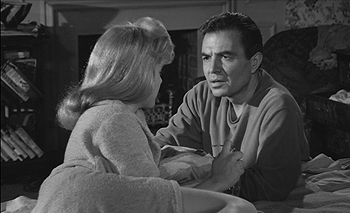 |
Shot 363 | Shot 364 |
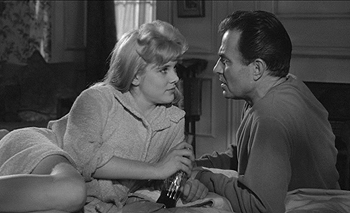 | 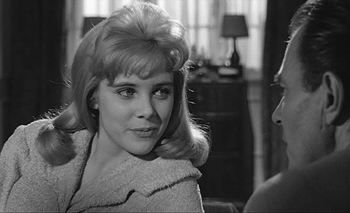 |
Shot 365 | Shot 366 |
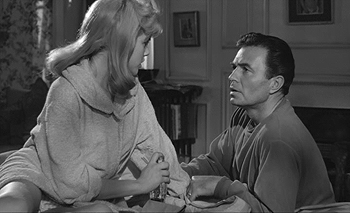 | 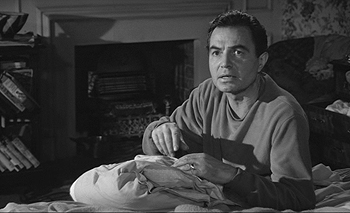 |
Crossfade to shot 367.
This section of the movie essentially replaces several in the screenplay that give a picture of Humbert's control over Lolita's life at Beardsley. In one scene, Lolita comes home with her friends Mona Dahl, Roy and Rex, and Humbert queries who where they've been. The Candy Bar. They are preparing to go to the Beach and Boat Club and Humbert refuses to let her go. In the next scene, Humbert and Lolita are in her room and Humbert queries her about Mona, to which Lolita replies with the line, "You can't have her, she belongs to a Marine." Humbert tells her he doesn't want her going out with friends and when she asks why she can't have any fun he lists off how she has fun with her bicycle and music lessons. Now is when she says she wants to be in the school play. There is nothing about her wanting Humbert to be proud of her. He replies, "You are in a play as it is. In a very difficult play where you have the part of an innocent schoolgirl." Humbert protests that she's never loved him, which is the main problem, and begs of her if she loves him, rather than Lolita asking if he loves her, as she does in the movie. The idea is of sexual favors and the next scene infers that she is now in the play because of willingly granting them.
In the book, much of Humbert's control over Lolita and consequent antagonism is delivered in narrative rather than conversation. The bit about Mona Dahl having a Marine boyfriend and Humbert's fear that Lolita had spoken to this experienced girl about him is delivered in narrative.
Though the movie begins with a toe nail painting scene, and we have another one here which is not a duplicate of the first (the nails are different colors) there is no toe nail painting scene in either the book or the screenplay.
You can barely make out Modigliani's famous painting of Elvira here. It is the one to screen right, only a portion of it shown, Elvira's hands resting on her lap.
In Eyes Wide Shut we see the same painting in Bill's office. Also in Bill's office is a painting of a woman, after bathing, sitting in a yellow chair, which refers back to Quilty talking about the execution chair and that no one knows it is yellow.
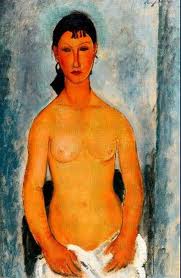
Elvira's appearance in Eyes Wide Shut occurs between Bill's visit to the Rainbow costume shop where he sees the Lolita-like girl again and the two Japanese men with whom she had been the previous evening. He had thought the girl's father was going to call the police on the two men, but the father says that other arrangements were made. He then seems to suggest that if Bill returns he may want to avail himself as well of her services, that there is more to be had there than costumes. Bill goes to his office, and we have the opportunity to see the paintings that are in it. He cancels his appointments and heads out again to Somerton where he will be told to cease his quest.
Information about Elvira is difficult to come by and conflicting. She was a dancer, I guess also a prostitute, daughter of a prostitute. She ran away from home at 15. I don't know at what age she was hooked up with Modigliani. Her nickname was "Quique". Quique means Enrique which is Henry? Some wonder if Quique wasn't supposed to be for "chica". If Kubrick knew of the nickname, Quique, may we have had the Modigliani painting here as another reference to Quilty, whose nick is Cue/Que, especially as it is in this scene that the the subject of Lolita's wanting to act in Quilty's play enters the film?
Elvira is a name of perhaps Spanish origin that may have meant "white" but is most frequently given as meaning "true". Elvira meaning "true" takes me back to Quilty's Drome ad which advertizes "real true taste".
It's the image of Quilty as the psychologist in shot 369 that helps pin down that this painting, Kubrick only showing us the hands on the lap, is supposed to represent him.
Humbert Humbert doesn't paint Lolita's toenails in either Nabokov's book or screenplay. The painting of the toenails would then be all Kubrick, and something which he considers to be of importance enough that he begins the movie with the toenails being painted, but those shots don't belong to this section.
That was a not-yet puzzle piece that became a resolved one when I happened to be watching Fritz Lang's Scarlet Street starring Edward G. Robinson and Joan Bennett. In the film, there's a scene in which Robinson was painting Bennett's toenails, and the temperament of it is such that I went, "A-ha!"
I have moved the remainder of this post's content to the following link: THE PAINTING OF THE TOENAILS, SCARLET STREET, THE WOMAN IN THE WINDOW, LA CHIENNE, MODIGLIANI'S ELVIRA, VIVIAN DARKBLOOM, AND THE CONFUSION BETWEEN THE MUSE AND THE ARTIST.
Humbert protests Lolita's complaints with a list of things he does with and for her, such as keeping house. But in the following section and then in the section in which he argues with Lolita following the play, the condition of the house is a shambles, down to pictures even being askew on the walls. It seems to me that this is more than just a joke, that we should look upon this blatant discrepancy as calling into question Humbert's version of their lives.
367 LS The wagon driving down a night street and stopping before Humbert's house at Beardsley. (1:43:44)
Crossfade to shot 368.
368 MS From interior, Humbert entering his house. (1:43:56)
He wanders through a house still trashed out with packing boxes, calling for Lo, past a staircase and into a room opposite the front door.
HUMBERT: Lo! Lo?
Shot 367 | Shot 368 |
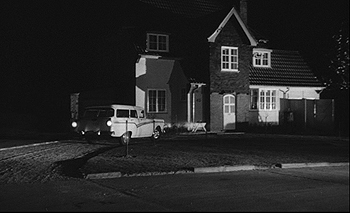 | 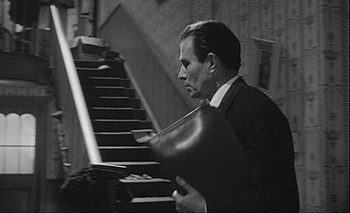 |
369 MLS Shot of Quilty's hands as Humbert opens the door onto the room in which he is seated. (1:44:10)
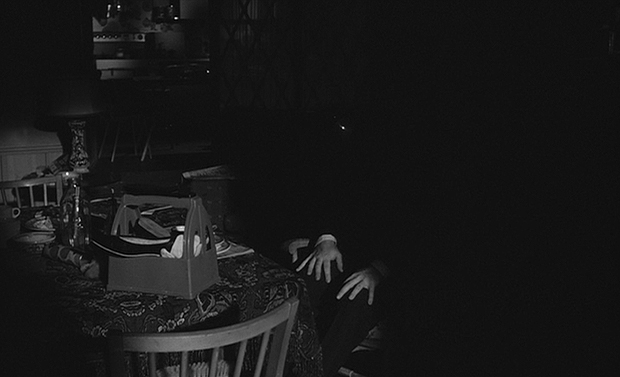
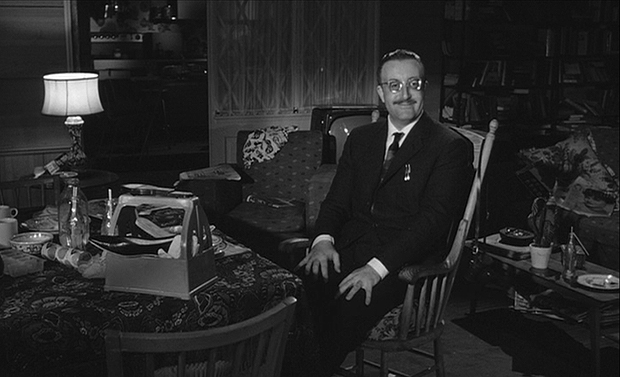
QUILTY: Good evening, Dr. Humbards.
Humbert cuts on the lamp.
370 MS Humbert. (1:44:13)
HUMBERT: Who are you?
QUILTY (rising): I am Dr. Zemph. Dr. Humbert, I am pleased to meet you. (They shake hands.) I am the Beardsley High School psychologist.
HUMBERT: Have you been here...? I mean, how did you get in?
QUILTY: Well, uh, your little daughter opened the door to me on the way to her piano lesson, and she said I was to wait in here until your arrival. And, so, here I am.
HUBMERT: Sit down. Make yourself at home.
QUILTY: I sat in the dark so as to save you the expense of the electricity.
HUMBERT: That was very considerate of you.
QUILTY: Oh, it was great pleasure.
371 MCU Quilty. (1:44:50)
372 MS Humbert and Quilty. (1:44:53)
HUMBERT: What can I do for you, Dr. Zemph?
373 MCU Quilty. (1:44:55)
QUILTY: Dr. Humbarts, would you mind if I am putting to you the blunt question?
374 MS Humbert and Quilty. (1:45:02)
HUMBERT: No, by all means do so.
QUILTY: We are wondering, has anybody instructed Lolita in the facts of life?
HUMBERT: The facts?
QUILTY: The facts of life. You see, Lolita is a sweet, little child, but the onset of maturity seems to be giving her a certain amount of trouble.
HUMBERT: I really don't think that this is a fit topic.
375 MCU Quilty. (1:45:26)
QUILTY: Well, Dr. Humbarts, to you she is still the little girl that is cradled in the arms, but to those boys over there at the Beardsley High, she is a lovely girl, you know...
376 MS Humbert and Quilty. (1:45:40)
QUILTY: ....with the swing, you know, the jazz, and she has got the curvatures which they take a lot of notice of. You and I, what are we? We are the symbols of power, sitting in our offices there. We are making the signatures, writing the contracts, and the decisions all the time. But if we cast our minds back, just think, what were we only yesterday? Yesterday, Dr. Humberts, you and I were little High School Jim and we were carrying little High School Jane's schoolbooks. You remember those days?
HUMBERT: In point of fact, Dr. Zemph, I am a lecturer...
377 MCU Quilty. (1:46:14)
HUMBERT (off screen): ...in French literature.
QUILTY: I have not made my point quite clear. I have some other details which I would like to put to you, Dr. Humbarts.
378 MS Humbert and Quilty. (1:46:27)
QUILTY (reading from index cards): She is defiant and rude. Sighs a good deal in the class. She sighs, makes the sound of...chews gum vehemently. All the time she is chewing this gum. Handles books gracefully. That's all right, doesn't really matter. Voice is pleasant. Giggles rather often and is excitable." She giggles at things. A little dreamy. Concentration is poor. She looks at the book for a while and then she gets fed up with it. Has private jokes of her own which no one understands so they can't enjoy them with her. She either has exceptional control or she has no control at all. We cannot decide which.
379 MCU Quilty. (1:47:02)
QUILTY: Added to that, just yesterday, Dr. Humbarts, she wrote a most obscene word with the lipstick, if you please, on the health pamphlets.
380 MS Humbert and Quilty. (1:47:14)
QUILTY:
And so, in our opinion, she is suffering from acute repression of the libido of the natural instincts.
HUMBERT: I fail to see the significance of all this as far as her record as a student is concerned, Dr. Zemph.
QUILTY: We Americans, we are progressively modern. We believe that it is equally important to prepare the pupils for the...
381 MS Quilty and Humbert. (1:47:43)
QUILTY: ...mutually satisfactory mating and the successful child rearing. That is what we believe.
HUMBERT: What do you suggest?
382 MCU Quilty. (1:47:50)
QUILTY: I am suggesting that Dr. Cudler, who is the district psychologist to the Board of Education...
383 MS Humbert and Quilty. (1:47:58)
QUILTY: ...should visit you in the home with his three member board of psychologists and once they are in the home they can investigate thoroughly in the home situation, with all four of them.
HUMBERT:
The...the...home situation?
QUILTY: So that they can get straight at the source of the repression.
HUMBERT: But she's not being repressed, Dr. Zemph.
384 MS Quilty and Humbert. (1:48:22)
QUILTY: Do I take it then that you are refusing to cooperate with Dr. Cudler and his men?
HUMBERT: I am not refusing anything at all, but please understand me, that, no, I don't want to...
QUILTY: What? What are you saying then?
385 MS Humbert and Quilty. (1:48:34)
HUMBERT: I absolutely refuse to have a quartet of strange psychologists nosing around my house.
QUILTY: Dr. Humbards, I'm afraid that (gets out a cigarette pack) you may have no choice. Cigarette?
HUMBERT (takes one): No choice?
QUIILTY: No choice. Keep the pack. (Tosses it on the table.) Look, Dr. Humbards (lights Humbert's cigarette) I don't wish to take this to a higher level of authority if I can possibly help it. Understand?
HUMBERT: I should hope not.
386 MCU Quilty. (1:49:09)
QUILTY: So you must help me.
387 MCU Humbert. (1:49:11)
HUMBERT: What can I do?
388 MS Quilty and Humbert. (1:49:16)
QUILTY: Perhaps, I don't know, but perhaps there is another approach that we can take. Something new altogether, something new, some new approach. What would you say? Would you...
389 MCU Humbert. (1:49:24)
QUILTY (off screen): ...like that? Some...
390 MS Quilty and Humbert. (1:49:27)
QUILTY: ...yeah, new area of adjustment that Lolita could find., perhaps by taking a larger share of the extracurricular school activities?
HUMBERT: I have never objected to her taking part in the extracurricular...
QUILTY: School activities. Pardon me.
391 MS Humbert and Quilty. (1:49:42)
QUILTY: You see, we have questioned Lolita on the home situation but she says not one word, stays with her lips buttoned up. So we are speaking with the friends of hers, and they are saying things which I wouldn't repeat to you here. But there is one thing which has arisen from this which is quite clear, that you, Dr. Humbards, should definitely un-veto that girl's nonparticipation in the school play.
Quilty pounds the table.
HUMBERT: All right, perhaps I was wrong in the attitude that I took about the school play.
QUILTY: That's very big of you to admit that.
392 MCU Quilty. (1:50:16)
QUILTY: And while you're at it, why don't you also loosen up a bit more on the other two D's...
393 MS Humbert and Quilty. (1:50:20)
QUILTY: ...the dating and the dance?
HUMBERT: Do you think that those are equally important?
QUILTY: Dr. Humberts, I tell you what I do think.
394 MCU Quilty. (1:50:28)
QUILTY (laughs, raising his eyebrows suggestively): I feel that you and I should do all in our power to stop that old Dr. Cudler and his quartet of psychologists from fiddling around in the home situation. That's what I feel.
395 MS Humbert and Quilty. (1:50:39)
QUILTY: Don't you agree with me? Yeah!
Crossfade to shot 396.
Shot 370 | Shot 371 |
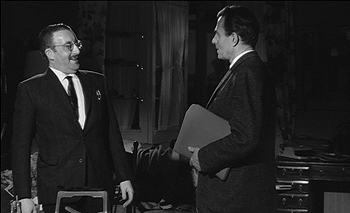 | 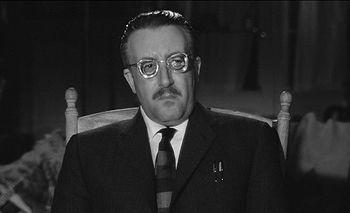 |
Shot 372 | Shot 373 |
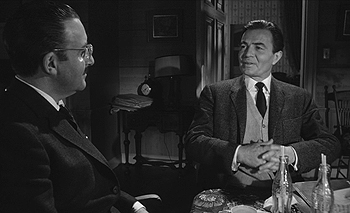 | 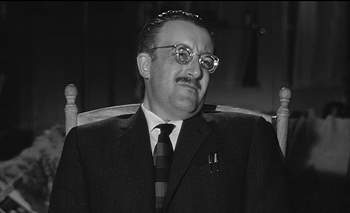 |
Shot 374 | Shot 375 |
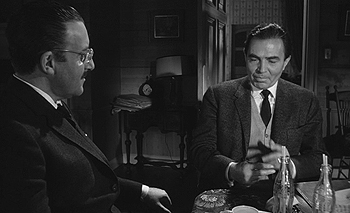 | 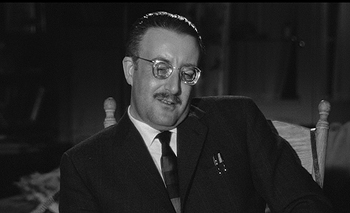 |
Shot 376 | Shot 377 |
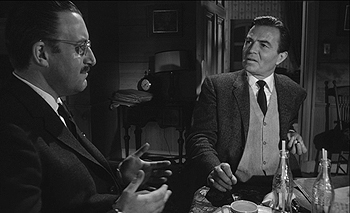 | 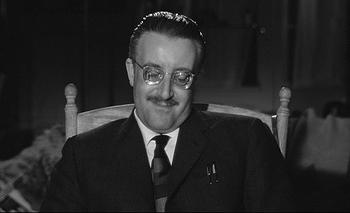 |
Shot 378 | Shot 379 |
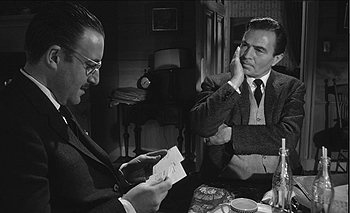 | 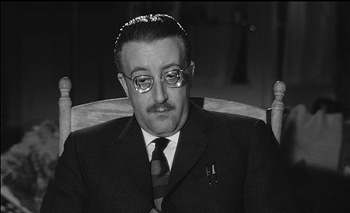 |
Shot 380 | Shot 381 |
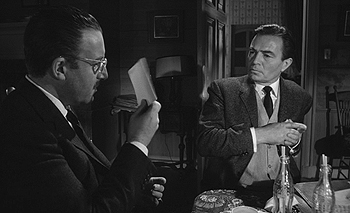 | 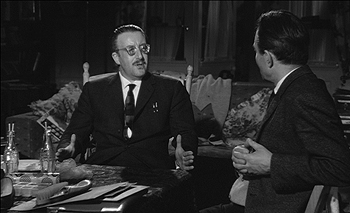 |
Shot 382 | Shot 383 |
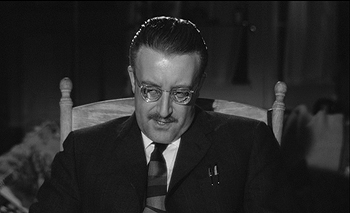 | 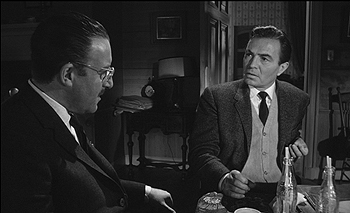 |
Shot 384 | Shot 385 |
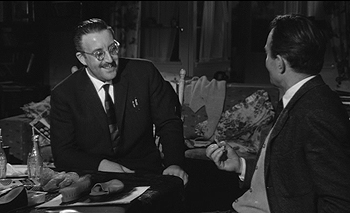 | 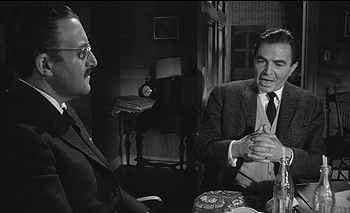 |
Shot 386 | Shot 387 |
 | 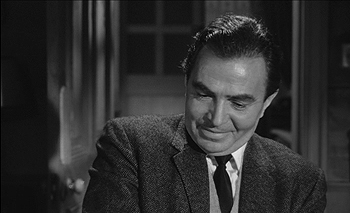 |
Shot 388 | Shot 389 |
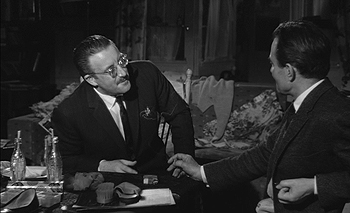 | 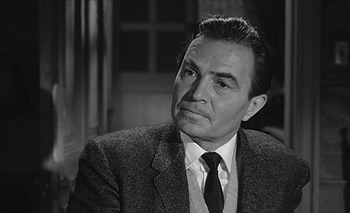 |
Shot 390 | Shot 391 |
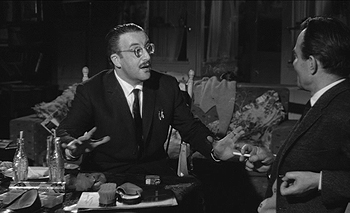 | 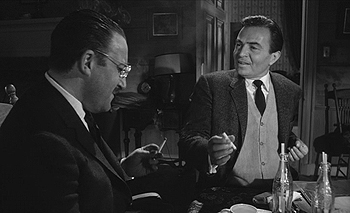 |
Shot 392 | Shot 393 |
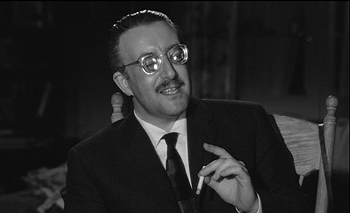 | 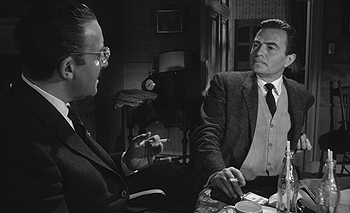 |
Shot 394 | Shot 395 |
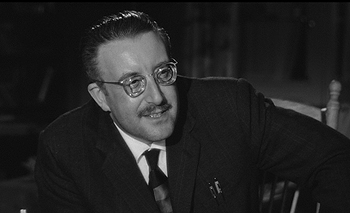 | 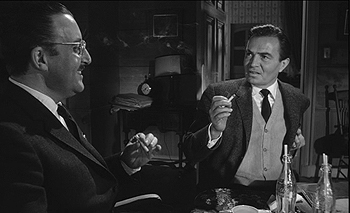 |
In the screenplay, this section comes after the play and the telephone booth scene, just preceding Lolita's decision to run off again with Humbert. Instead of a personal visit from Quilty, he makes a phone call (one obviously planned with Lolita just before). Quilty identifies himself as an "extramural student" who has been studying Humbert's case, and that the group he represents is anxious that children should not keep late hours. He then says he is a private member of the Public Welfare Board and has heard bizarre rumors about Humbert's relationship with the child. He asks if Humbert has adopted her or filed a petition to adopt her.
HUMBERT: I assume that a stepfather is a relative and that a relative is a natural guardian.
QUILTY: Are you aware that the word "natural" has rather sinister connotations?
Quilty asks if Humbert agrees she must have a guardian and not be merely a pet. He inquires if Humbert has seen his psychiatrist lately, to which Humbert replies he doesn't need one. Now we have a section of conversation that in the movie instead occurs in the telephone call before Humbert finds Lolita has left the hospital with Quilty.
QUILTY: You are classified in our files as a white widowed male. Are you prepared to give our investigator a report on your present sex life, if any?
He says a Dr. Blanche Schwarzman shall visit them. Humbert says he's "afraid" he has nothing to tell her, and Quilty says "afraid" is Freudian lingo. And that's about it. Quilty asserts again that there will be a visitor the day after next and hangs up. Thus the immediate fleeing of Beardsley by Humbert and Lolita.
In the book, portions of Quilty's conversation with Humbert are delivered by impersonal sources such as Beardsley's approach to educating girls to be wives and an advice column for teens.
To you she is a little girl. To the boys she's charming and fun, lovely and gay. They like her. Today you clinch big deals in an executive's office, but yesterday you were just high school Jim carrying Jane's school books. Remember?
Eventually Humbert has a conversation with a woman named Pratt, at the school, who, describing him as being an old-fashioned Continental father, relates how "the onset of sexual maturing" seems to be giving Dolly Haze some trouble. She tells him that Lolita is bright but her marks are getting worse and worse. Lighting a cigarette, she runs through some of the dialogue transferred here to Quilty. She relates that Lolita's mind wanders, she sighs a good deal in class, chews gum vehemently, giggles rather often, is little dreamy, and has private jokes of her own. She wants to know if Dolly has been instructed in the process of mammalian reproduction, for Dolly remains morbidly uninterested in sexual matters, "or, to be exact, represses her curiosity in order to save her ignorance and self-dignity". It's advised Lolita have a chat with a doctor on the facts of life, be allowed to date, and that Humbert un-veto her nonparticipation in the dramatic group. "She was such a perfect little nymph in the try-out..." When Humbert seems reticent, and argues that Lolita is a normal and happy child, Miss Pratt reveals that teachers and schoolmates find Lolita to be antagonistic, dissatisfied, cagey--"and everybody wonders why you are so firmly opposed to all the natural recreations of a normal child."
Humbert agrees to let Lolita be in the play as long as all male parts are taken by females.
Miss Pratt eventually gets around to discussing how it's upsetting that Dolly "has written a most obscene four-letter word which our Dr. Cutler tells me is low-Mexican for urinal with her lipstick on some health pamphlets".
Humbert says he'll thrash it out with her and Miss Pratt says if things don't improve she would like Lolita to be analyzed by Dr. Cutler.
Quilty reads from index cards. Nabokov composed his books on index cards. He also, for interviews, insisted on knowing the questions beforehand and scripted all his responses. A 1959 interview between Humbert and Trilling reveals Nabokov's lap burdened with index cards and notes.
I have moved the contents of this section to this post: The Deceptive Layout of the Haze and Beardsley Households in Lolita, How the Deception Occurs, and When We are Awakened to the Deception.
It has already been pointed out in section three how Quilty as Dr. Zemph is discretely concealed in the DROME ad in Lolita's room.
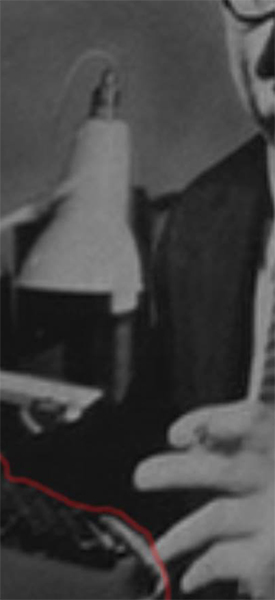
A tight crop of Quilty shows Dr. Zemph. But we've already discussed that back when Humbert is in Lolita's room mourning her departure for Camp Climax.
396 LS Exterior of the theater. (1:50:44)
397 MS Vivian, Quilty and Lolita in the wings. (1:50:49)
MALE CHARACTER (off screen): I stand before you, a rearsome bucky goat no more. Tremble not, little nymph. You see before you a weary goat. The bewitcher is bewitched.
LOLITA: Look, Semiramis, look!
SEMIRAMIS: Yes, the goat removeth his horns.
LOLITA: Let us take him to the Dark Kingdom.
SEMIRAMIS: Yes.
LOLITA: To the Dark Kingdom, away, away!
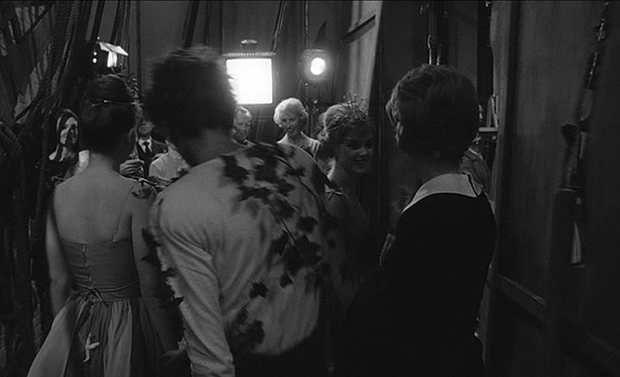
Humbert enters the back stage wing opposite from which Vivian and Quilty stand. As the cast goes to take their curtain call bows, he speaks with Miss Starch.
STARCH: Why, good evening, Dr. Humbert!
HUMBERT: Miss Starch! Good evening!
STARCH: Did you enjoy the performance?
HUMBERT: Very much. I enjoyed every minute of it.
STARCH: I wondered if the symbolism wasn't heavy-handed at times.
HUMBERT: I know what you mean, but weren't the boys and girls charming?
STARCH: They were, weren't they? And particularly little Lolita. She was quite perfect. You must be awfully proud of her.
HUMBERT: Yes, I am. You know, her performance took me completely by surprise! She made me promise not to watch any of the rehearsals.
STARCH: They're so intense at that age. She must have worked awfully hard. No wonder you decided to suspend her piano lessons. After all, there are only...
HUMBERT: I beg your pardon, did you say, suspend her piano lessons?
STARCH: Yes. Do you play, Dr. Humbert?
HUMBERT: Hardly at all now. Didn't she have a lesson with you last Saturday?
STARCH: No.
HUMBERT: Nor the preceding Saturday?
STARCH: No. She called to say she was busy rehearsing.
HUMBERT: Busy rehearsing?
STARCH: As a matter of fact, she hasn't had a lesson for, let me see, four weeks! I hope I haven't spoken out of turn.
HUMBERT: No, no, not at all. I must have misunderstood.
STARCH: By the way, Dr. Humbert, there are so few people in Beardsley who appreciate music, I was wondering, sometime, if you'd like to come by I could play something for you.
HUMBERT: Yes, of course, certainly I will. Thank you. Excuse me now.
Humbert makes his way toward Lolita who lingers on the stage.
398 MCU Lolita with the Goat, Roy. (1:52:42)
ROY: Oh, good evening, Dr. Humbert.
LOLITA: Hi, Dad!
SEMIRAMIS: Wasn't it wonderful?
LOLITA: How did you like it?
SEMIRAMIS: We're having a party at my house for the cast and author. Everybody's invited.
HUMBERT: I'm afraid I must take Lolita home.
LOLITA: What?
HUMBERT: Our starlet has had enough excitement.
SEMIRAMIS: It's really gonna be fun.
LOLITA: You can't be serious.
SEMIRAMIS: They all want to meet you!
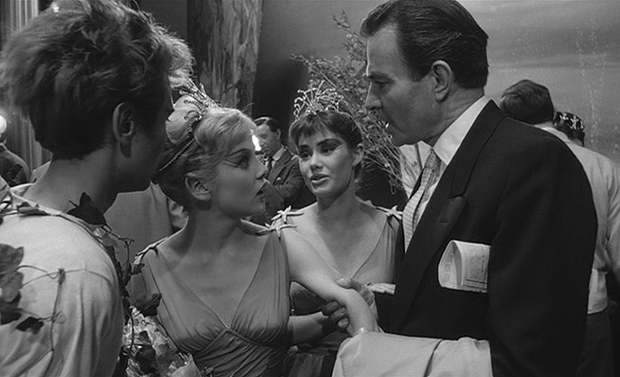
HUMBERT (having gripped Lolita's arm): I wouldn't want you to miss any more piano lessons.
LOLITA: I haven't missed any.
HUMBERT: You know what I'm talking about.
SEMIRAMIS: It wasn't going to be late.
HUMBERT: Say goodnight to your friends.
LOLITA: Oh, come one, now. This isn't a regular party. This is a cast party.
HUMBERT (leading her away): Come on. Come on.
LOLITA: This is the cast party.
HUMBERT: We'll discuss it later.
Led away, Lolita stares at Miss Starch.
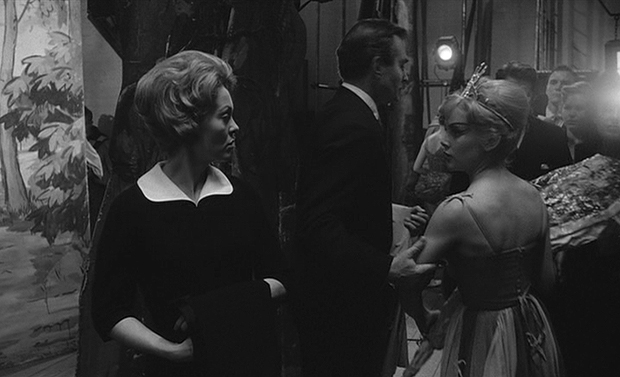
399 MS Vivian and Quilty. (1:53:11)
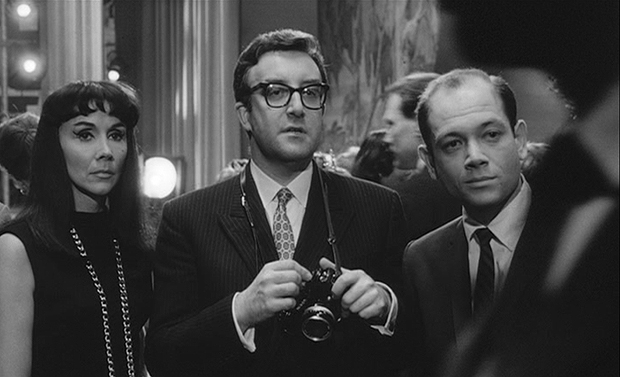
QUILTY: Brewster, go and get some Type "A" Kodachrome.
BREWSTER: Okay.
Crossfade to shot 400.
This is a very short section in the screenplay concerned mostly with Humbert learning from Miss King, the piano teacher, that Lolita hasn't been to practice in four weeks. They don't discuss their thoughts on the play itself. As soon as Lolita appears and asks if she can go to Mona's aunt's for a party, Humbert insists she's going home. She says she'll do anything if he lets her go. She says she loves him. Still, he grasps her hand and they leave.
Earlier in the screenplay, just after the introduction of them to Beardsley, there is a scene with Quilty, Vivian Darkbloom and Humbert. An instructor who is showing Quilty and Vivian around, stops Humbert and introduces them. Quilty immediately acknowledges he's seen Humbert a a couple of times in Ramsdale. When Vivian announces herself, Quillty says, "My collaborator, my evening shadow. Her name looks like an anagram. But she's a real woman--or anyway a real person. You're an inch taller than me, aren't you m'dear?" Vivian says that her niece, Mona, goes to school with Humbert. Quilty remarks that, "You know the first thing people usually say when I'm introduced to them is how much they like, or simply adore, my Nymphet on TV." When Humbert says he has a vague recollection of it, Quilty responds, "Good for you. I often wonder what is technically more vague--a vague recollection or a vague premonition." Humbert responds that some of his best friends are phantoms. Quilty lights himself a cigarette, that he remarks is not a Drome, but a special Spanish blend made for him and his urgent needs.
The book gives some description of the school play.
I did not bother to read the complete text of The Enchanted Hunters, the playlet in which Dolores Haze was assigned the part of a farmer's daughter who imagines herself to be a woodland witch, or Diana, or something, and who, having got hold of a book on hypnotism, plunges a number of lost hunters into various entertaining trances before falling in her turn under the spell of a vagabond poet (Mona Dahl)...The coincidence of the title with the name of an unforgettable inn was pleasant in a sad little way...I assumed the playlet was just another, practically anonymous version of some banal legend. Nothing prevented one, of course, from supposing that in quest of an attractive name the founder of the hotel had been immediately and solely influenced by the chance fantasy of the second-rate muralist he had hired, and that subsequently the hotel's name had suggested the play's title. But in my credulous, simple, benevolent mind I happened to twist it the other way around, and without giving the whole matter much thought really, supposed that mural, name and title had all been derived from a common source, from some local tradition, which I, an alien unversed in New Eneland lore, would not be supposed to know...actually The Enchanted Hunters was a quite recent and technically original composition which had been produced for the first time only three or four months ago by a highbrow group in New York. To me--inasmuch as I could judge from my charmer's part--it seemed to be a pretty dismal kind of fancy work, with echoes from Lenormand and Maeterlinck and various quiet British dreamers. The red-capped, uniformly attired hunters, of which one was a banker, another a plumber, a third a policeman, a fourth an undertaker, a fifth an underwriter, a sixth an escaped convict...went through a complete change of mind in Dolly's Dell, and remembered their real lives only as dreams or nightmares from which little Diana had aroused them; but a seventh Hunter (in a green cap, the fool) was a Young Poet, and he insisted, much to Diana's annoyance, that she and the entertainment provided (dancing nymphs, and elves, and monsters) were his, the Poet's invention. I understand that finally, in utter disgust at this cocksureness, barefooted Dolores was to lead check-trousered Mona to the paternal farm behind the Perilous Forest to prove to the braggard she was not a poet's fancy, but a rustic, down-to-brown-earth lass--and a last minute kiss was to enforce the play's profound message, namely, that mirage and reality merge in love.
Lolita, herself, eventually asks Humbert if he remembers the name of the hotel where he raped her, and asks was it The Enchanted Hunters, then rolls away on her bike laughing.
In the book, one night Humbert is playing chess with Gaston, "mopping up Gustave's--I mean Gaston's--king's side", when he gets a call from Miss Emperor, the piano teacher, asking if Lo is coming to her next piano lesson as she had missed previous lessons. Upset by this, Humbert almost loses his queen but succeeds in achieving a draw. He then goes home for a confrontation with Lolita and she says she has been rehearsing the play with Mona. Which leads to the next scene, the fight, for, in the book, Lolita is never even in the play. She and Humbert instead skip town.
Kubrick switches this scene to be the one early in the film in which Charlotte, playing chess with Humbert, loses her king and is in threat of losing her queen.
Nabokov often speaks of the writer as being an enchanter. While his Humbert is one of the enchanted. In book and screenplay, the play is The Enchanted Hunters, echoing the hotel at which Humbert and Lolita stayed. Kubrick switches it around so that in the movie the play is The Hunted Enchanters.
Nabokov's description of the play in the book has been abandoned. Lolita has no name in it. All we know is a satyr removes his horns and she and Semiramis lead him to the Dark Kingdom.
Semiramis, daughter of a fish-goddess, an ancient queen, some believed of Babylon, is a shadowy individual who has been represented as lustful, and an alchemist with a knowledge of plants.
She appeared in The Divine Comedy as one condemned to hell for her lust. The wife of Ninus, after his death she married her son.
In Voltaire's play, having an affair with Assur, she murdered her husband, the king. Their son, Ninias, was preserved by being taken away from the palace. Fifteen years later, Assur is plotting to kill Semiramis as she's failed to marry him and make him king. Semiramis instead plans to marry a warrior who she doesn't realize to be her son, she believing her son to be dead. Warned away from the marriage by Ninus' ghost, Ninias determines to avenge his father's death by killing Assur, and instead accidentally kills Semiramis.
So it seems Semiramis is yet another incarnation of the Oedipus myth. Sometimes she marries her son. In literature, sometimes the Oedipal destiny is averted by supernatural assistance.
Perhaps of some interest, considering how the play in the book was supposed to have concerned a poet, and here instead we've only the name Sermiramis, are several plays from about 1918 by an Olive Tilford Dargan, collected in the book, Semiramis and Other Plays. I've no idea what Semiramis is about, but another play, The Poet, is about none other than Edgar Allan Poe and young Virginia Clemm. Poe, having been rejected by a woman named Helen, becomes fixated upon Virginia. Pleading with her mother to be allowed to marry her, her mother objecting as she's only a child, Poe insists Virginia, rather than being mortal, is an immortal sister to Psyche. They marry and the play follows through to Virginia's death and his subsequent decay. The point of its staging largely escapes me except to give an actor a character in which he can rave then rave some more. I gather, from a letter she wrote concerning it, that Olive's intention was to vindicate Poe's life through the passion of his work.
This is Vivian Darkbloom's (Nabakov's alter) final appearance in the film, and what we may have is a play less concerned with Humbert's destruction (for it certainly has to do with that) than the enchanter artist/author succumbing to the enchantment of his subject/muse. Lolita, the nymph, positively leers as she takes the stage, the goat shearing himself of his horns, telling her she has no more reason to tremble due him.
Roy means King, so if we're looking for chess references we could look upon this as a checkmate.
400 MLS From interior, Lolita and Humbert enter the house. (1:53:25)
He grabs her arm as she starts to go up the stairs to the second floor.
HUMBERT: You're not going upstairs.
LOLITA: Yes, I am!
HUMBERT: We're going to have a little talk.
LOLITA: Let go of me!
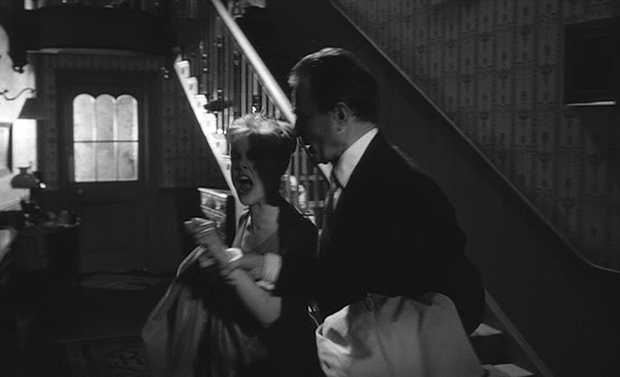
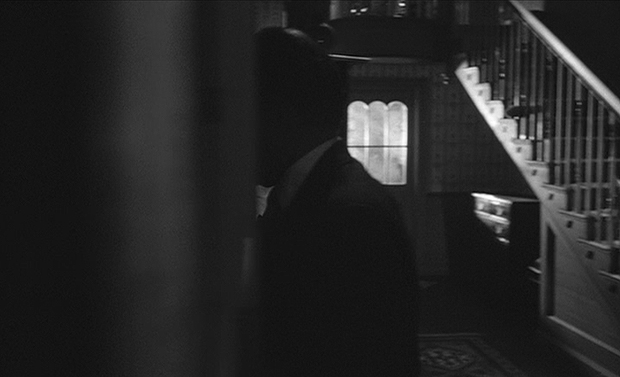
As they pass through the black of the separating wall.
LOLITA (off screen): You're hurting my arm!

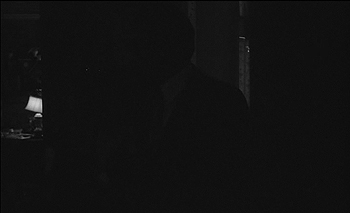
HUMBERT: Stop shouting!
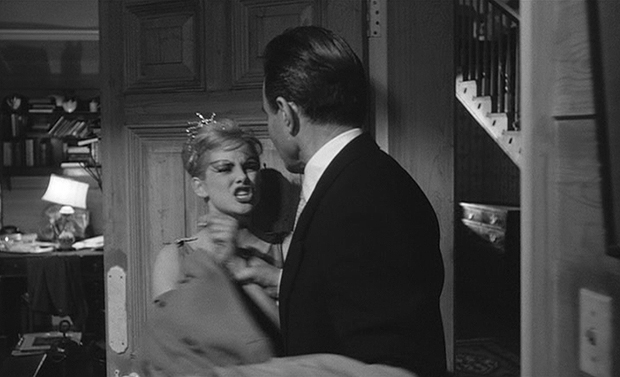
LOLITA: You let me go, you jerk! Let go of me!
HUMBERT: Sit down! Now you're going to answer a few questions.
LOLITA: You've got a big, fat nerve dragging me away.
HUMBERT: Stop this silly noise! Stop it!
LOLITA: Who do you think you are, not letting me go to the party?
HUMBERT: Do you want the police to come here? (He closes the rear door.) Stop that shouting.
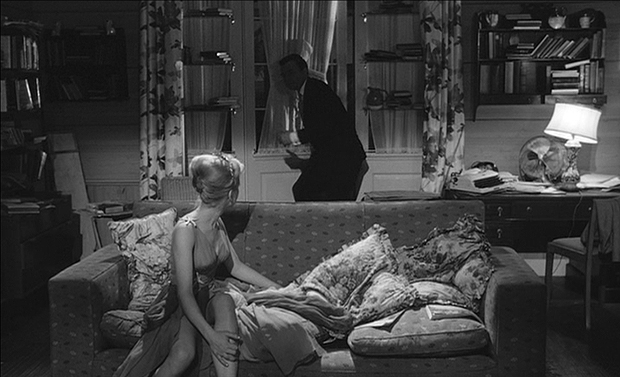
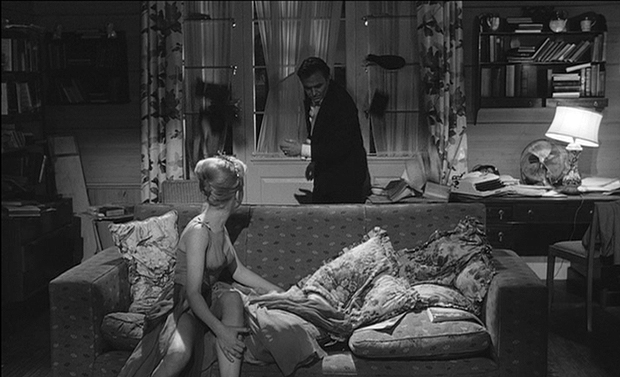
As he slams the door, bookcases to either side of the door let go their contents which fall to the ground. This may allude to Quilty telling Humbert about the people who are like furniture, the man who is just like a bookcase.
LOLITA: I don't care if the police do come in here.
HUMBERT: All right, all right, now the doors are shut. Come on, shouting! Let's hear how loud you can shout. Come on. Now, perhaps you will tell me, what were you doing on Saturday between 2:00 and 4:00 in the afternoon?
LOLITA: I went to my piano lesson.
HUMBERT: That's a lie.
LOLITA: It is not.
HUMBERT: I happen to know you haven't been to a piano lesson for four weeks now.
LOLITA: Oh, yeah? Well, just ask Miss Starch.
HUMBERT: I asked Miss Starch. How do you think I know? She told me. I saw her this evening. Didn't you see her at the performance?
LOLITA: Yeah.
HUMBERT: All right, now tell me, what have you been doing these afternoons?
LOLITA: You really want to know?
HUMBERT: Yes, I do. I really want to know.
LOLITA: All right. I'm going to tell you the real truth of what I've been doing. I've been going to extra rehearsals.
HUMBERT: That's the most fatuous lie you could possibly think up. Don't tell me any more because I know what you've been doing. You've been with this boy, this leading man of yours, this Roy, isn't that so?
LOLITA: You're sick.
HUMBERT: Oh, stop! Don't throw those silly, silly clichés at me.
LOLITA: No, seriously.
HUMBERT: Don't tell me any more. You've been with this boy, haven't you? Come on, tell me.
LOLITA: You need help. You're imagining things.
HUMBERT: Shut up, Lolita. Stop that silly talk. Lolita. Lolita. Now, if you swear to me that this isn't true I promise that I will believe you.
LOLITA: I'm not going to swear anything. Why should I? You'll never believe me, no matter what.
HUMBERT: I will, I will believe you.
LOLITA: No, you won't. Let's face it, you won't believe me.
HUMBERT: I swear. I'll forget the whole thing. I'll never cross question you about it again.
LOLITA: No, you'll never believe me. Why should I swear to you?
401 MCU Lolita and Humbert, Lolita popping her gum. (1:55:52)
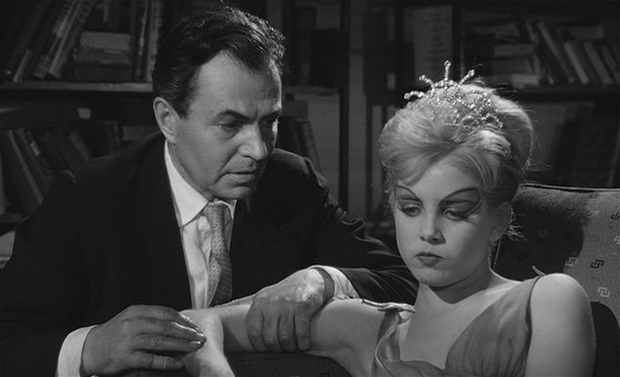
HUMBERT: All right, I believe you. It's partly my fault. I realize that. It's something that's happened on account of this horrible place. All these people poking their nose into our business, and I never see you anymore, what with your soda fountains, and your extra...
She pops another bubble and he yells.
HUMBERT: Stop doing that! But we could leave this place perhaps. Yes, there's nothing to keep us here. We haven't any obligations here. We don't owe rent to anybody. We could just pack up our bags. Tonight. We could go now. I could take you for a wonderful trip round the country.
LOLITA: You can't leave here.
HUMBERT: Why not?
LOLITA: Well, you've got to work. What about your job?
HUMBERT: My job, that doesn't mean anything. I could always publish articles. My book's going to be published quite soon. It's a wonderful idea.
LOLITA: Well, I have to go to school. What about my education?
HUMBERT: Your education? What sort of an education do you think you're getting here? You got a much better education when you were travelling around with me.
402 MS Lolita and Humbert. (1:57:05)
LOLITA: Well, the play has two more performances next week.
HUMBERT: Oh, don't start talking about the play to me. That's what's just come between us. That's what started this whole row. Look, don't you want to get back to where we were before we came to this horrible place? Don't you want to come away with me?
LOLITA (rising, screaming): No! I hate you! I hate you!
HUMBERT (grabbing her): Lolita! You want to stay with this filthy boy!
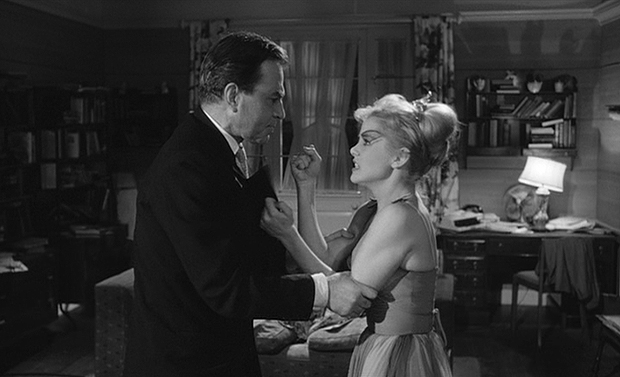
LOLITA: Yes! Why can't you leave me alone?
HUMBERT: Shut your filthy mouth you horrid little psychopath!
LOLITA: Don't tell me what to do! You're a nauseating creep!
HUMBERT: I promise you one thing, you're not going to see these filthy boys anymore, I'll tell you that. That's one thing that...
LOLITA: Oh, yeah? Well, I've got news for you. I'll do anything I want to, anytime I want to, with anyone I want to...
HUBMBERT: Shut your filthy mouth!
A knocking.
LOLITA: ...and you can't stop me!
HUMBERT: Shut up!
403 MS Front door from the inside as Humbert goes to answer it. (1:57:53)
HUMBERT: Oh, Miss Lebone.
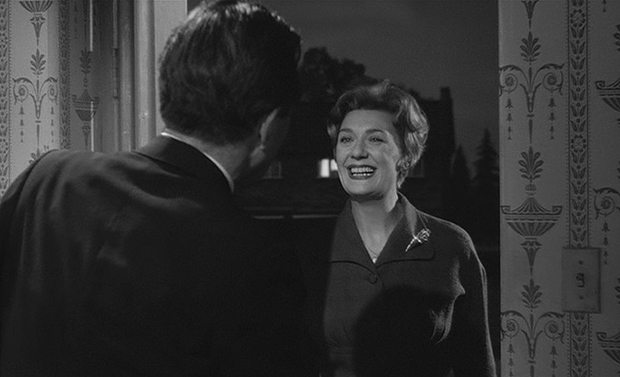
LEBONE: Dr. Humbert, may I come in?
HUMBERT: What can I do for you?
LEBONE: Well, this is a little awkward to say, but I'm, well, I thought you ought to know, this noise, I can hear every word next door.
HUMBERT: Well, we were having a family row.
LEBONE: Yeah.
HUMBERT: The child's voice is very shrill when she gets upset.
LEBONE: Yes, of course, well, I understand perfectly, but, well, I, I happen to have company and he's a minister of the church, and you know...
HUMBERT: Perhaps you can convey my apologies to him, and, you know, we were quarrelling about piano lessons.
LEBONE: Well, hello, dear!
LOLITA (putting on her coat as she passes and exits): Hello, Miss Lebone. (To Humbert.) Goodnight!
LEBONE: What a pretty getup!
HUMBERT: She was in the school play tonight.
LEBONE: Oh, yes, of course, the school play. Dr. Humbert, I do hope you don't think that I'm presuming on our good neighbor relations, but, well, I think I ought tell you that the neighbors are beginning to get a little curious about you and your girl.
HUMBERT: I can't think why they should do that.
LEBONE: Well, you know how people talk. I must get back to my guest. Would you care to join us for a little while?
HUMBERT: That's very nice of you, thank you very much, but I'll take a rain check on it.
LEBONE: Oh, right. Well, goodnight!
HUMBERT: Goodnight.
Humbert also exits and closes the door. Crossfade to shot 404.
This is a spectacular fight and there is nothing like it in the screenplay. Again, as with much of the action, certain feelings belonging to the characters in the screenplay are switched about. In the screenplay, an agitated Humbert says Lolita can't torment him like she has been, that he will not surrender. Lolita simply goes and gets herself something to eat. In the kitchen, Humbert goes on about his being a fool in supplying so many opportunities for Lolita to meet whomever...bike rides etc. She simply walks out and goes to the living room. He follows her and tells her she's ruining their relationship and jeapordizing her own safety. "I don't know, nor wish to know, what young hoodlum, Roy or Foy, you are dating in secret. But all this must stop or else anything might happen." The window is given as being open and that Humbert's voice rises to a hysterical pitch. When Lolita attempts to run out of the room he grabs her wrist, telling her he'll break it if her must but she will listen, that they will leave the next day and go start a new life in Mexico. She twists away and runs out of the house, going to the gas station.
The confrontation with Ms. Lebone is earlier, after the bumping into Quilty and Vivian and before the play. An old lady with a "hawk eye", she first stops Humbert to talk to him about his jungle of dandelions. Humbert protests they are immigrants, as are they all, and deserving of kindness. Lebone doesn't buy this one bit, then gets on to inquiring if his pretty little girl gets enough sleep.
I notice the light in her bedroom off and on, off and on, at all hours of the night. That is her bedroom window, isn't it. There's a string dangling from your pocket.
Humbert says that every time he undoes a parcel he puts the string in his pocket, and Lebone continues on, insisting that "Dolly" come over to her house and read the books her mother gave her when she was a child, which would be more wholesome than listening to the radio at full blast.
In the book, Lebone is again an old lady and in narrative is described as asking questions about the family and giving Lolita books to read that her mother had given her.
Now, onto the fight. As I was saying in the previous section, there is no big night of the play in the book. Before the play is put on, Humbert finds out Lolita has missed piano rehearsals and confronts her. They do have a big blow out in which he grabs her.
From that moment, I stopped restraining my voice, and we continued yelling at each other, and she said unprintable things. She said she loathed me. She made monstrous faces at me, inflating her cheeks and producing a diabolical plopping sound. She said I had attempted to violate her several times when I was her mother's roomer. She said she was sure I had murdered her mother...It was a strident and hateful scene. I held her by her knobby wrist and she kept turning and twisting it this way and that...but I held her quite hard and in fact hurt her rather badly...and once or twice she jerked her arm so violently that I feared her wrist might snap...and our voices were drowning the telephone, and when I grew aware of its ringing she instantly escaped.
Now calls Fenton Lebone, incognito, who complains about the noise. Humbert hears Lolita escape out the front door. Rushing out to locate her, he finds her at a telephone booth.
404 LS Lolita on a pay telephone. (1:59:16)
We hear a train engine's churning as it passes, a dog barking, Humbert running through the gas station and up to the phone booth.
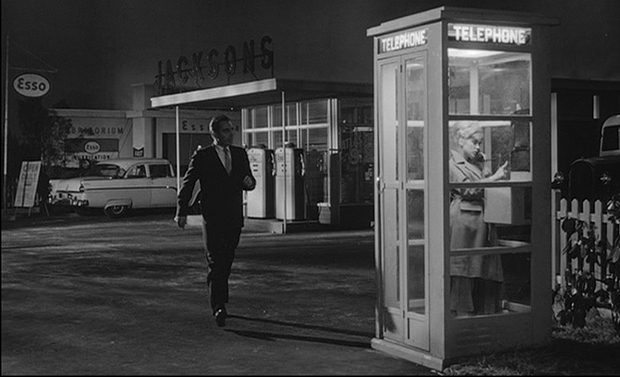
405 MS Humbert forces open the door. (1:59:27)
The light in the booth goes off as he does so. Lolita hangs up the phone. In the background is a BRAKES sign with an outstretched palm of a hand as if indicating STOP. To the side is the price 14 which reminds of Lolita's age.
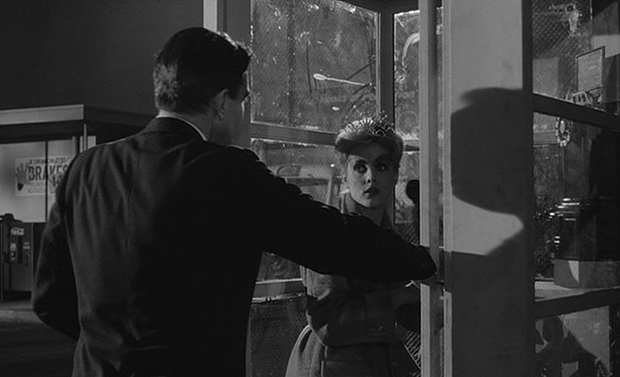
HUMBERT:
All right. Come on, we're going home.
LOLITA: Wait a minute.
HUMBERT: I forbade you to go to that party, didn't I?
LOLITA: I wasn't going to the party.
HUMBERT: Who were you talking to just now?
LOLITA: I tried to call you.
HUMBERT: You were speaking to somebody just now on the telephone. Who was that?
We hear again as if the chugging of the train, but then it goes away.
LOLITA:
I got a wrong number. Listen, I've decided something.
HUMBERT: Yes?
LOLITA: I want to leave school.
HUMBERT: You what?
LOLITA: I don't want you to be mad at me anymore. Everything's going to be great from now on.
HUMBERT: You mean that?
LOLITA: I hate school, and I hate the play. I really do. I never want to go back.
HUMBERT: That's good.
LOLITA: Let's leave tomorrow. We can go for a long trip, and we'll go wherever I want to, won't we?
HUMBERT: Yes, my darling.
LOLITA: Are you glad?
HUMBERT: Yes, of course I am.
LOLITA: To hell with the play! See what I mean?
HUMBERT: Yes, that's good!
LOLITA: Let's go home. I feel sort of romantic.
Crossfade to shot 406.
This scene in the film condenses several scenes in the screenplay that are interrupted by the phone call from Quilty.
In the screenplay, after his argument with her, Humbert follows Lolita to the phone booth. She tells him she was trying to reach him at home.
HUMBERT: You did? That's odd. I saw you speaking, I saw your lips move.
LOLITA: Yes, I got the wrong number. Look, I don't want you to be mad at me any more. Everything is going to be all right from now on. I've reached a great decision.
At that point they return home. Next the staircase, Lolita tells him to carry her upstairs, that she's feeling romantic. The telephone rings and when Humbert suggests they let it ring she demands he answer it. It's now we have the dialogue with Quilty. When this is done, an upset Humbert tells Lolita it must have been a hoax, to which she insists that they must get away. She suggests to Mexico, where she was conceived.
HUMBERT: I'm sure I'll find a lecturing job there. Marvelous! I know a Spanish poet in Mexico City. He is full of black bulls and symbols, and as corny as a matador. But he is influential.
Lolita says all right, as long as she traces out their route, which should take them through Arizona where she wants to see the Indian dances at Elphinstone.
In the book, after their argument, Humbert pursues Lolita, finding her in the telephone booth. Lolita says she tried to reach him at home and that she's made a great decision. She wants to leave school. She hates it and the play (which is still in rehearsals). They must go at once, on a long trip, but this time they will go wherever she wants to go.
Who the hell is Jack Brewster? Brewster only appears in the book with Quilty asking if Humbert is Jack Brewster, Humbert saying he is, and Quilty saying he doesn't look like Jack Brewster--despite his probably knowing this is Humbert, and he calls Humbert Brewster another couple of times during that assassination scene when we are quite sure he knows who Humbert is.
Kubrick goes so far as to make a character of Brewster, one who Quilty sends for some Kodachrome Type A. The reason I raise here the question of "Who is Jack Brewster", rather than after the school play, is due the name of the Esso gas station to which Lolita has retreated to make her phone call, which is Jacksons.
Humbert's real name, if you will remember, is Jean-Jacques Humbert.
There's a curious section in the book where Humbert, by then living with Rita, his lover after Lolita has fled, wakes up one morning to find a squalid kind of character at the end of their bed. He has no memory of how the squalid character got there, and neither seemingly does Rita. On top of this, the squalid character is given as completely amnesiac. He insinuates that Humbert and Rita somehow had "purloined his (worthless) identity." They take the man to the hospital. A year later he is still there, "isolated from his personal past", and has been named Jack Humbertson.
The son of Jean-Jacques Humbert. Which we aren't to take literally.
This incident compels Humbert to explore memory in a paper called "Mimir and Memory"...
...in which I suggested among other things that seemed original and important to that splendid review's benevolent readers, a theory of perceptual time based on the circulation of the blood and conceptually depending (to fill up this nutshell) on the mind's being conscious not only of matter but also of its own self, thus creating a continuous spanning of two points (the storable future and the stored past).
Mimir is The Remember, who was beheaded and thereafter Odin carried that wise head around which gifted him with secret knowledge. There are numerous examples of the oracular head in literature.
The Esso station may hint itself at the esoteric, The Online Etymology Dictionary gives "from esotero 'more within,' comparative adverb of eso 'within'...".
Of course Lolita is lying to Humbert. She's called Quilty. But on another level, the level on which Quilty operates as a shadow of Humbert, the level on which Humbert is confused with Jack Brewster (who went out for Kodachrome Type A in the film, and who is said, in the book, to have a brother with a telephone company), the level on which Quilty complains about people invading his house and making phone calls, there's more going on.
In the book, though Quilty has asked him if he is "Jack Brewster", Humbert replies, "Je suis Monsieur Brustere." Bruster seems to be, though a variant of Brewster (a brewer), an occupational name for an embroiderer, from Old French brouder, which has a relationship with braiding, weaving, twisting together. Nabokov knew his words and if he made the switch from Brewster to Brustere, I imagine there was a reason, for the book is full of endless word play.
What one can reason is that Kubrick understood the significance and importance of Brewster or else he wouldn't have invented a part for him as the man who goes to buy the Kodachrome Type A.
November 2014 transferred to html. Originally posted sometime before 2012. Approx 9800 words or 20 single-spaced pages. A 75 minute read at 130 wpm.
Go to Part 6
Go to Table of Contents of the analysis (and supplemental posts)
Link to the main TOC page for all the analyses